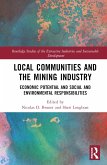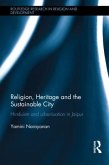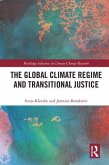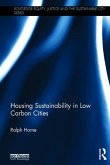The Carbon Fix
Forest Carbon, Social Justice, and Environmental Governance
Herausgeber: Paladino, Stephanie; Fiske, Shirley J
The Carbon Fix
Forest Carbon, Social Justice, and Environmental Governance
Herausgeber: Paladino, Stephanie; Fiske, Shirley J
- Gebundenes Buch
- Merkliste
- Auf die Merkliste
- Bewerten Bewerten
- Teilen
- Produkt teilen
- Produkterinnerung
- Produkterinnerung
Written by a diverse group of anthropologists, environmental researchers, environmentalists, and policy-makers, The Carbon Fix closely examines the current model for dealing with global warming-paying for carbon capture-and the negative effects this model has on rural communities, indigenous groups, and others in less developed regions who depend on or control carbon- sequestering lands.
Andere Kunden interessierten sich auch für
![Local Communities and the Mining Industry Local Communities and the Mining Industry]() Local Communities and the Mining Industry168,99 €
Local Communities and the Mining Industry168,99 €![Nature Is a Battlefield Nature Is a Battlefield]() Razmig KeucheyanNature Is a Battlefield25,99 €
Razmig KeucheyanNature Is a Battlefield25,99 €![Religion, Heritage and the Sustainable City Religion, Heritage and the Sustainable City]() Yamini NarayananReligion, Heritage and the Sustainable City191,99 €
Yamini NarayananReligion, Heritage and the Sustainable City191,99 €![Animals and the Environment Animals and the Environment]() Animals and the Environment187,99 €
Animals and the Environment187,99 €![Conflict, Negotiations and Natural Resource Management Conflict, Negotiations and Natural Resource Management]() Conflict, Negotiations and Natural Resource Management220,99 €
Conflict, Negotiations and Natural Resource Management220,99 €![The Global Climate Regime and Transitional Justice The Global Climate Regime and Transitional Justice]() Sonja KlinskyThe Global Climate Regime and Transitional Justice181,99 €
Sonja KlinskyThe Global Climate Regime and Transitional Justice181,99 €![Housing Sustainability in Low Carbon Cities Housing Sustainability in Low Carbon Cities]() Ralph HorneHousing Sustainability in Low Carbon Cities188,99 €
Ralph HorneHousing Sustainability in Low Carbon Cities188,99 €-
-
-
Written by a diverse group of anthropologists, environmental researchers, environmentalists, and policy-makers, The Carbon Fix closely examines the current model for dealing with global warming-paying for carbon capture-and the negative effects this model has on rural communities, indigenous groups, and others in less developed regions who depend on or control carbon- sequestering lands.
Hinweis: Dieser Artikel kann nur an eine deutsche Lieferadresse ausgeliefert werden.
Hinweis: Dieser Artikel kann nur an eine deutsche Lieferadresse ausgeliefert werden.
Produktdetails
- Produktdetails
- Verlag: Taylor & Francis
- Seitenzahl: 356
- Erscheinungstermin: 10. November 2016
- Englisch
- Abmessung: 229mm x 152mm x 21mm
- Gewicht: 644g
- ISBN-13: 9781611323320
- ISBN-10: 1611323320
- Artikelnr.: 44157724
- Herstellerkennzeichnung
- Libri GmbH
- Europaallee 1
- 36244 Bad Hersfeld
- gpsr@libri.de
- Verlag: Taylor & Francis
- Seitenzahl: 356
- Erscheinungstermin: 10. November 2016
- Englisch
- Abmessung: 229mm x 152mm x 21mm
- Gewicht: 644g
- ISBN-13: 9781611323320
- ISBN-10: 1611323320
- Artikelnr.: 44157724
- Herstellerkennzeichnung
- Libri GmbH
- Europaallee 1
- 36244 Bad Hersfeld
- gpsr@libri.de
Stephanie Paladino, Ph.D., is an environmental anthropologist with the Center for Applied Social Research, University of Oklahoma, and Co-Editor of Culture, Agriculture, Food and Environment. She researches how environmental governance strengthens equity and sustainability, most recently in the areas of carbon forestry offset markets, oil spill response, ecologically protected areas, and the Rio Grande basin. Shirley J. Fiske is an environmental anthropologist with career experience in the executive and legislative branches of the US government in ocean, climate, and natural resources management policy and governance. Most recently she worked on carbon sequestration and climate change cap-and-trade legislation in the US Senate. She is currently Research Professor at the University of Maryland and recent chair of a national task force on climate change for the American Anthropological Association (2011-2014) (www.aaanet.org).
FOREWORD
The Carbon Offsetting Dilemma
Esteve Corbera
INTRODUCTION
Carbon Offset, Markets, and Social Equity: Trading in Forests to Save the
Planet
Shirley J. Fiske and Stephanie Paladino
SECTION I: FRAMING THE CARBON REGIME IN THE CONTEXT OF GLOBAL TRENDS
1. A Genealogy of Exchangeable Nature
James Igoe
2. Profits and Promises: Can Carbon Trading Save Forests and Aid
Development?
Kathleen McAfee
3. Forest Carbon Sinks Prior to REDD: A Brief History of their Role in the
Clean Development Mechanism
María Gutiérrez
4. Justice and Equity in Carbon Offset Governance: Debates and Dilemmas
Mary Finley-Brook
SECTION II: ACCOUNTING AND ACCOUNTABILITY
5. The Limitations of International Auditing: The Case of the Norway-Guyana
REDD+ Agreement
Janette Bulkan
6. Corporate Carbon Footprinting as Techno-political Practice
Ingmar Lippert
7. Regulating Fairness in the Design of California's Cap-and-Trade Market
Patrick Bigger
SECTION III: NATIONAL AND SUBNATIONAL FRAMINGS
8. Carbon, Carbon Everywhere: How Climate Change is Transforming
Conservation in Costa Rica
Robert Fletcher
9. Customary Landowners, Logging Companies, and Conservationists in a
Decentralized State: The Case of REDD+ and PES in Papua New Guinea
David Lipset and Bridget Henning
10. Interrogating Public Debates over Jurisdictional REDD+ in California's
Global Warming Solutions Act: Implications for Social Equity
Libby Blanchard and Bhaskar Vira
11. Doing REDD+ Work in Vietnam: Will the New Carbon Focus Bring Equity to
Forest Management?
Pamela McElwee
SECTION IV: REDD, RIGHTS, AND EQUITY
12. Renegotiating REDD: Beyond Social Safeguards to Social Contracts
Michael Brown
13. A Win-Win Scenario? The Prospects for Indigenous Peoples in Carbon
Sequestration: REDD Projects in Brazil
Janet Chernela and Laura Zanotti
14. Equity Concerns During REDD+ Planning and Early Implementation:
A Case from Malawi
Heather Yocum
15. Lessons from Community Forestry for REDD+ Social Soundness
Janis B. Alcorn
SECTION V: ALTERNATIVE CONFIGURATIONS OF COMMUNITY AND GOVERNANCE
16. Empowering Forest Dependent Communities: The Role of REDD+ and PES
Projects
Mark Poffenberger
17. Climate Mitigation Based in Adaptation: El Salvador's Restoration of
Mangrove Ecosystems, 2011-2013
Fiona Wilmot
18. A Critical Reflection on Social Equity in Ugandan Carbon Forestry
Adrian Nel
The Carbon Offsetting Dilemma
Esteve Corbera
INTRODUCTION
Carbon Offset, Markets, and Social Equity: Trading in Forests to Save the
Planet
Shirley J. Fiske and Stephanie Paladino
SECTION I: FRAMING THE CARBON REGIME IN THE CONTEXT OF GLOBAL TRENDS
1. A Genealogy of Exchangeable Nature
James Igoe
2. Profits and Promises: Can Carbon Trading Save Forests and Aid
Development?
Kathleen McAfee
3. Forest Carbon Sinks Prior to REDD: A Brief History of their Role in the
Clean Development Mechanism
María Gutiérrez
4. Justice and Equity in Carbon Offset Governance: Debates and Dilemmas
Mary Finley-Brook
SECTION II: ACCOUNTING AND ACCOUNTABILITY
5. The Limitations of International Auditing: The Case of the Norway-Guyana
REDD+ Agreement
Janette Bulkan
6. Corporate Carbon Footprinting as Techno-political Practice
Ingmar Lippert
7. Regulating Fairness in the Design of California's Cap-and-Trade Market
Patrick Bigger
SECTION III: NATIONAL AND SUBNATIONAL FRAMINGS
8. Carbon, Carbon Everywhere: How Climate Change is Transforming
Conservation in Costa Rica
Robert Fletcher
9. Customary Landowners, Logging Companies, and Conservationists in a
Decentralized State: The Case of REDD+ and PES in Papua New Guinea
David Lipset and Bridget Henning
10. Interrogating Public Debates over Jurisdictional REDD+ in California's
Global Warming Solutions Act: Implications for Social Equity
Libby Blanchard and Bhaskar Vira
11. Doing REDD+ Work in Vietnam: Will the New Carbon Focus Bring Equity to
Forest Management?
Pamela McElwee
SECTION IV: REDD, RIGHTS, AND EQUITY
12. Renegotiating REDD: Beyond Social Safeguards to Social Contracts
Michael Brown
13. A Win-Win Scenario? The Prospects for Indigenous Peoples in Carbon
Sequestration: REDD Projects in Brazil
Janet Chernela and Laura Zanotti
14. Equity Concerns During REDD+ Planning and Early Implementation:
A Case from Malawi
Heather Yocum
15. Lessons from Community Forestry for REDD+ Social Soundness
Janis B. Alcorn
SECTION V: ALTERNATIVE CONFIGURATIONS OF COMMUNITY AND GOVERNANCE
16. Empowering Forest Dependent Communities: The Role of REDD+ and PES
Projects
Mark Poffenberger
17. Climate Mitigation Based in Adaptation: El Salvador's Restoration of
Mangrove Ecosystems, 2011-2013
Fiona Wilmot
18. A Critical Reflection on Social Equity in Ugandan Carbon Forestry
Adrian Nel
FOREWORD
The Carbon Offsetting Dilemma
Esteve Corbera
INTRODUCTION
Carbon Offset, Markets, and Social Equity: Trading in Forests to Save the
Planet
Shirley J. Fiske and Stephanie Paladino
SECTION I: FRAMING THE CARBON REGIME IN THE CONTEXT OF GLOBAL TRENDS
1. A Genealogy of Exchangeable Nature
James Igoe
2. Profits and Promises: Can Carbon Trading Save Forests and Aid
Development?
Kathleen McAfee
3. Forest Carbon Sinks Prior to REDD: A Brief History of their Role in the
Clean Development Mechanism
María Gutiérrez
4. Justice and Equity in Carbon Offset Governance: Debates and Dilemmas
Mary Finley-Brook
SECTION II: ACCOUNTING AND ACCOUNTABILITY
5. The Limitations of International Auditing: The Case of the Norway-Guyana
REDD+ Agreement
Janette Bulkan
6. Corporate Carbon Footprinting as Techno-political Practice
Ingmar Lippert
7. Regulating Fairness in the Design of California's Cap-and-Trade Market
Patrick Bigger
SECTION III: NATIONAL AND SUBNATIONAL FRAMINGS
8. Carbon, Carbon Everywhere: How Climate Change is Transforming
Conservation in Costa Rica
Robert Fletcher
9. Customary Landowners, Logging Companies, and Conservationists in a
Decentralized State: The Case of REDD+ and PES in Papua New Guinea
David Lipset and Bridget Henning
10. Interrogating Public Debates over Jurisdictional REDD+ in California's
Global Warming Solutions Act: Implications for Social Equity
Libby Blanchard and Bhaskar Vira
11. Doing REDD+ Work in Vietnam: Will the New Carbon Focus Bring Equity to
Forest Management?
Pamela McElwee
SECTION IV: REDD, RIGHTS, AND EQUITY
12. Renegotiating REDD: Beyond Social Safeguards to Social Contracts
Michael Brown
13. A Win-Win Scenario? The Prospects for Indigenous Peoples in Carbon
Sequestration: REDD Projects in Brazil
Janet Chernela and Laura Zanotti
14. Equity Concerns During REDD+ Planning and Early Implementation:
A Case from Malawi
Heather Yocum
15. Lessons from Community Forestry for REDD+ Social Soundness
Janis B. Alcorn
SECTION V: ALTERNATIVE CONFIGURATIONS OF COMMUNITY AND GOVERNANCE
16. Empowering Forest Dependent Communities: The Role of REDD+ and PES
Projects
Mark Poffenberger
17. Climate Mitigation Based in Adaptation: El Salvador's Restoration of
Mangrove Ecosystems, 2011-2013
Fiona Wilmot
18. A Critical Reflection on Social Equity in Ugandan Carbon Forestry
Adrian Nel
The Carbon Offsetting Dilemma
Esteve Corbera
INTRODUCTION
Carbon Offset, Markets, and Social Equity: Trading in Forests to Save the
Planet
Shirley J. Fiske and Stephanie Paladino
SECTION I: FRAMING THE CARBON REGIME IN THE CONTEXT OF GLOBAL TRENDS
1. A Genealogy of Exchangeable Nature
James Igoe
2. Profits and Promises: Can Carbon Trading Save Forests and Aid
Development?
Kathleen McAfee
3. Forest Carbon Sinks Prior to REDD: A Brief History of their Role in the
Clean Development Mechanism
María Gutiérrez
4. Justice and Equity in Carbon Offset Governance: Debates and Dilemmas
Mary Finley-Brook
SECTION II: ACCOUNTING AND ACCOUNTABILITY
5. The Limitations of International Auditing: The Case of the Norway-Guyana
REDD+ Agreement
Janette Bulkan
6. Corporate Carbon Footprinting as Techno-political Practice
Ingmar Lippert
7. Regulating Fairness in the Design of California's Cap-and-Trade Market
Patrick Bigger
SECTION III: NATIONAL AND SUBNATIONAL FRAMINGS
8. Carbon, Carbon Everywhere: How Climate Change is Transforming
Conservation in Costa Rica
Robert Fletcher
9. Customary Landowners, Logging Companies, and Conservationists in a
Decentralized State: The Case of REDD+ and PES in Papua New Guinea
David Lipset and Bridget Henning
10. Interrogating Public Debates over Jurisdictional REDD+ in California's
Global Warming Solutions Act: Implications for Social Equity
Libby Blanchard and Bhaskar Vira
11. Doing REDD+ Work in Vietnam: Will the New Carbon Focus Bring Equity to
Forest Management?
Pamela McElwee
SECTION IV: REDD, RIGHTS, AND EQUITY
12. Renegotiating REDD: Beyond Social Safeguards to Social Contracts
Michael Brown
13. A Win-Win Scenario? The Prospects for Indigenous Peoples in Carbon
Sequestration: REDD Projects in Brazil
Janet Chernela and Laura Zanotti
14. Equity Concerns During REDD+ Planning and Early Implementation:
A Case from Malawi
Heather Yocum
15. Lessons from Community Forestry for REDD+ Social Soundness
Janis B. Alcorn
SECTION V: ALTERNATIVE CONFIGURATIONS OF COMMUNITY AND GOVERNANCE
16. Empowering Forest Dependent Communities: The Role of REDD+ and PES
Projects
Mark Poffenberger
17. Climate Mitigation Based in Adaptation: El Salvador's Restoration of
Mangrove Ecosystems, 2011-2013
Fiona Wilmot
18. A Critical Reflection on Social Equity in Ugandan Carbon Forestry
Adrian Nel








